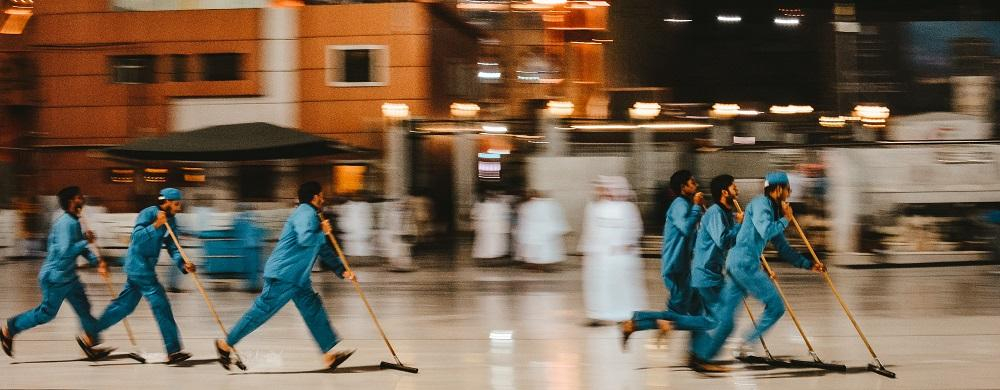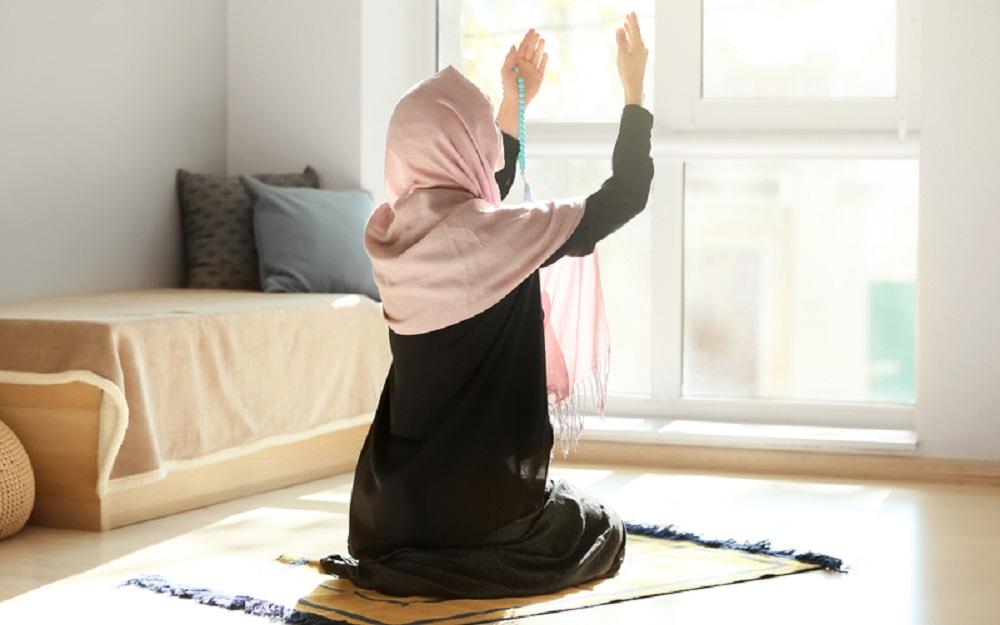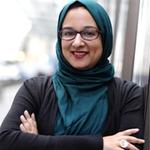What Can We Learn in COVID Times from the Sacrifice of Prophet Ibrahim (as)?
Faith
|
Jul 22, 2020
|
3 MIN READ

Everything feels like a sacrifice these days, no matter who you are, what economic bracket you live in or what your station in life is. It feels like a lot of sacrificing from morning to night, from staying at home to staying away from loved ones, to wearing a mask when it feels difficult, to avoiding all the social activities that perhaps feed our souls, to not being able to go to our masajid …
… And finally, to our hajj pilgrimage being cancelled for international travelers and restricted to a small number of locals. Sacrifice upon sacrifice, more for some than others, disproportionately affecting some communities more than others. How do we continue to stay the course and keep faith in Allah’s (S) plan? What is there to be learned from all this sacrifice in the age of the global COVID-19 pandemic?

Workers cleaning the Haram in Makkah. Photo by Adli Wahid on Unsplash
How can we apply the situation we are in now to our worship in these ten holy days of Dhul Hijjah?
When you think about the ultimate story of sacrifice in Islam, in all Abrahamic faiths for that matter, the story of Prophet Ibrahim (as) is front and center. It is a story we honor with qurbani/udhiya on the holiday of Eid ul Adha, which also coincides with the annual Hajj pilgrimage. As the story goes:
It is said that [Prophet] Ibrahim (as) experienced a dream one night, in which Allah (S) told him to sacrifice Ismail (as), his beloved son. At first, Ibrahim (as) believed this was the devil playing tricks on him, and he immediately disregarded it. However, the following night, the same dream occurred again commanding him to do the same. Ibrahim (as) then came to realise that this was no fluke and was, in fact, a message from Allah (S).Ibrahim (as) loved his son, Ismail (as). Yet he was fully prepared to follow Allah's (S) command and do as He instructed. He took his son to the top of Mount Arafat and brought with him a knife and rope. Upon reaching an appropriate place, he told his son about his dream and what Allah (S) had commanded him to do. Being an obedient son, Prophet Ismail (as) immediately obliged to the wishes of Allah (S) and his father, and asked that his hands and legs be tied so that he may not struggle and that his father blindfold himself so that he does not have to witness him suffer.Ibrahim (as) did as Ismail (as) had said. Blindfolded and with the knife in his hands, he did as Allah (S) had asked of him. When he took the blindfold off, to his surprise, he saw the body of a dead ram in front of him. Ismail (as) was completely unharmed standing right next to him. At first, he thought that something had gone horribly wrong and that he had disobeyed the order of his Creator. But then he heard a voice telling him that Allah (S) looks after his followers and that he need not worry.A divine miracle had taken place. Ibrahim (as) and Ismail (as) had just passed a difficult test from Allah (S).
To be asked to sacrifice one’s most beloved child because Allah (S) commanded is the ultimate test of total faith in Allah (S)’s plan and in His reasons for testing us, even though we may not understand. How many times in life have you dealt with or managed a difficult situation that required sacrifice and adjustment without understanding the why’s of it all? I think most of us can find examples like that from our own lives.

In my own home and life, we are going on nearly four months of sheltering-in-place. All of my children’s schools closed, as has been the case for so many kids around the country. But, that was especially challenging and difficult for my eldest, who (if you are a regular reader of the HH blog, then you know) is profoundly autistic. Our support staff and our family mutually decided to stop working together as well when this all started. So, there has been no help for my son D and a complete stop to his schooling and education for months. (Virtual learning started for him in June, but it has been very limited as he requires hands-on learning.)
At every turn, life has felt like one big sacrifice amid all the blessings we have. I wake up many mornings wondering how long I can keep all this up only to say Bismillah and get on with my day. Alhamdulillah.
This is what Allah (S) is asking of all of us. To do the work of making sacrifices in our lives for the betterment of ourselves and our communities. To be vigilant in our carefulness. To wear masks when we need to go out. To social distance. To continue to curtail our activities. To be away from friends and family when we crave being together so much. To think of the public health of our communities beyond what we individually may or may not want.
Cancer families sacrifice immensely throughout treatment and their lives. Those with chronic illness figure out entirely different ways to live. Individuals with autism and their families sacrifice, adapt and change in more ways than I can share with you. The examples are so plentiful. These are things that are thrust upon us without asking for them.
If there is anything I’ve learned, it’s that if you are a person of faith and believe that Allah (S) knows best and that He is the most merciful, the most forgiving – then all we can do is accept sacrifice when it is asked of us in whatever shape or form. My prayer is that during these holy days of Dhul Hijjah, you can find sakoon (peace) within this concept as well as the strength to keep moving forward in these difficult times with full trust in Allah (S).
I pray you find the time to lean into your ibadah (worship) during these special days. Dhul Hijjah during COVID times is like Ramadan during COVID times – something unique, weirdly different and special. It’s a gift that we have this time right now to reap the rewards and blessings that Allah has to give us. So, go get yours.
Subscribe to be the first to know about new product releases, styling ideas and more.
What products are you interested in?

